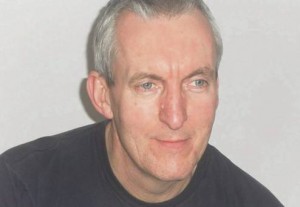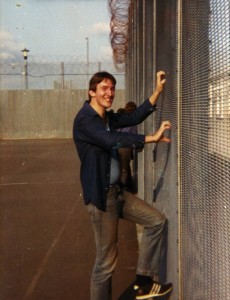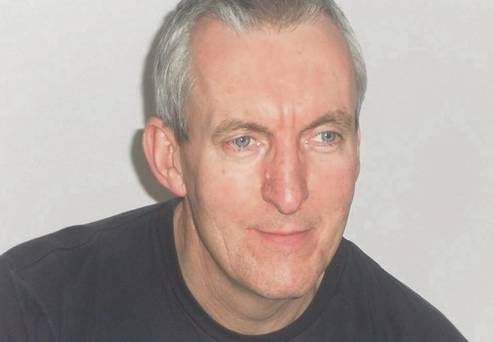
Laurence McKeown.
An exhibition co-ordinated by a former Long Kesh IRA hunger striker opens in Derry today.
Laurence McKeown’s “Aftermath” will be on display in the Verbal Arts Centre until Thursday.
The exhibition brings together people directly affected by trauma during the North’s troubles to share their experiences through photography, film and music.
Filmmaker and “Aftermath” director Laurence McKeown and commissioned artist Anthony Haughey have worked closely with victims/survivors of the Northern conflict, asylum seekers, refugees and people displaced by conflict.
The exhibition features an extensive series of photographs by Anthony Haughey, a series of filmed interviews by Laurence McKeown, a specially designed sound installation, which engages visitors with the participants’ narratives and a commissioned music score by Elaine Agnew, which includes the voices of participants.
The exhibition also includes archival newspaper articles and photographs documenting the growing tensions in Northern Ireland from 1968.

Laurence McKeown in the H-Block exercise yard in the 1980s.
There will be a panel discussion on Thursday evening to discuss the themes of the exhibition with panel members Laurence McKeown, former RUC man Roger McCallum, Crows on the Wire Community Engagement Co-Ordinator Mhairi Sutherland and Derry film director Margo Harkin.
The exhibition is free and open to the public daily from 10.00am to 5.30pm with Thursday’s panel discussion starting at 6.30pm with refreshments.
Laurence McKeown (58), a native of Randalstown in County Antrim, spent 70 days on hunger strike in 1981.
He joined the IRA at 17 and in August 1976 was charged with causing explosions and the attempted murder of a member of the RUC was found guilty and sentenced to life imprisonment the following April.
While in Long Kesh prison, he took part in the H-Block blanket protest and dirty protest, attempting to secure the return of Special Category Status for convicted paramilitary prisoners.
In late 1980, the protest escalated and seven prisoners – including Raymond McCartney from Derry – took part in a hunger strike, aimed at restoring political status by securing what were known as the “Five Demands”:
• The right not to wear a prison uniform;
• The right not to do prison work;
• The right of free association with other prisoners, and to organise educational and recreational pursuits;
• The right to one visit, one letter and one parcel per week;
• Full restoration of remission lost through the protest.
The strike ended before any prisoners had died and without political status being secured, and a second hunger strike began on 1 March 1981 led by Bobby Sands, the IRA’s former Officer Commanding in the prison.
McKeown joined the strike on 29 June, after Sands and three other prisoners had died.
Following the deaths of six other prisoners, McKeown’s family authorised medical intervention to save his life on 6 September, the 70th day of his hunger strike.
He described his recollection of the events in an interview:
“You’re very sleepy and very, very tired and you’re sort of nodding off to sleep but something’s telling you to keep waking up.
“This was the thing that kept everybody going through the hunger strike in trying to live or last out as long as possible.
“I knew death was close but I wasn’t afraid to die – and it wasn’t any sort of courageous or glorious thing. I think death would have been a release.
“You can never feel that way again. It’s not like tiredness. It’s an absolute, total, mental and physical exhaustion. It’s literally like slipping into death.”
McKeown completed a bachelor’s degree in social science from the Open University while in prison before being released in 1992, and subsequently obtained a Ph.D. from Queen’s University Belfast.
In the mid-1990s, he co-founded the Belfast Film Festival and has written two books about republican prisoners in the Long Kesh –Nor Meekly Serve My Time: The H-Block Struggle 1976-1981 (co-written with Brian Campbell and Felim O’Hagan) was published in 1994, and Out Of Time: Irish Republican Prisoners, Long Kesh, 1972-2000 was published in 2001.[8]
McKeown and Brian Campbell co-wrote a film about the 1981 hunger strike called H3 which was directed by Les Blair, and premiered in cinemas on 28 September 2001.
Before the death of Campbell in 2005, he and McKeown also wrote two plays together, The Laughter of Our Children which debuted in 2001, and A Cold House which debuted in 2003.
McKeown’s first solo play, The Official Version, debuted on 18 September 2006.
In 2006 he appeared in a two-part documentary titled Hunger Strike, which was shown on RTÉ to mark the 25th anniversary of the 1981 hunger strike.
Tags:






